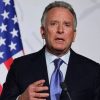 The Bank Governor said his models were being undermined by the quality of the country's labor market data. Photo: Justin Tullis/WPA Pool/Getty Images Europe
The Bank Governor said his models were being undermined by the quality of the country's labor market data. Photo: Justin Tullis/WPA Pool/Getty Images Europe
Andrew Bailey blamed «serious problems» with UK employment data for errors in the Bank of England's forecasts as he admitted he did not know the true extent of the country's unemployment crisis.
The Bank Governor said her models were being undermined by the poor quality of the country's labor market data.
He said the wage growth figures were not on target, adding that the «tools» policymakers used to make judgments about economic growth, jobs and prices «haven't served us particularly well.»
Mr Bailey told the Lord the Economic Affairs Committee noted that gaps in official data published by the Office for National Statistics (ONS) make it particularly difficult to estimate how many people are out of work and how many have given up looking for work altogether.
The number According to official figures, the number of people of working age who are not working or looking for work is now approaching a record high of 9.3 million.
However, the ONS has admitted there are problems in collecting data. Statisticians are currently working on a new official job survey after a drop in responses made the figures less reliable.
The new model was originally expected to be rolled out in March, but has now been delayed until September. Rob Kent-Smith, deputy head of the Office of Statistical Regulation, told the Financial Times this week there was a «way forward» before it recommits official jobs data.
Mr Bailey said the Bank was forced to use alternative measures of employment as part of its assessment of the economy. However, he added that there were «fewer indicators» of unemployment and «especially the difference between unemployment and unemployment», which he described as «more challenging» for policymakers.
Mr Bailey said: «It is also a difficult task» . [in terms of] what exactly are the reasons for inaction and what conclusions can we draw from those reasons in terms of what might happen in the future.»
He added: «We have several models, and None of them, frankly speaking, inspires much confidence in us.
“Now we can say well, if you have supply shocks like pandemics and wars, what do you expect? But these tools were of no use to us.”
The Bank has come under fire in recent years for its forecasting errors after initially underestimating the strength of inflation in the early stages of the cost of living crisis. Some economists are now concerned that policymakers will be too slow to cut interest rates as inflation falls.
Former US Federal Reserve Chairman Ben Bernanke is currently reviewing the Bank of England's forecasts. His report is expected in the spring.
Mr Bailey's comments came hours after ONS data showed inflation unexpectedly held steady at 4% in January. Analysts had forecast that inflation would rise to 4.1%, given the recent jump in electricity bills.
The data raised hopes that the Bank could start cutting rates sooner than expected.
G Bailey called the figures «good news» due to the «broad» nature of the slowdown in price growth.
However, he warned that «deep-rooted» problems with the way the ONS collects data on jobs make the task of setting interest rates more «challenging».
Policymakers at the Bank of England still face challenges challenging prospects after figures on Tuesday showed wages were still rising faster than they thought was consistent with inflation falling to the 2 percent target.
Mr Bailey criticized the range. models used by the Bank to estimate wage growth. He said: “We have a number of models… that estimate wage equations. None of this, frankly, has worked well.”
The governor added that it was “in the balance” whether the UK would go into recession at the end of 2023.
Thursday's data is expected to show the economy suffered another consecutive quarter of contraction between October and the end of December, marking the first technical recession since the 2020 lockdown.
Chancellor Jeremy Hunt said inflation data showed that the UK had made «tremendous progress in reducing inflation from 11%».
Lower prices for furniture and food helped offset the impact of higher energy price caps. Grant Fitzner, chief economist at the ONS, said: «Prices of furniture and household goods have fallen for more than a year, and food prices fell this month for the first time in more than two years.»


























































Свежие комментарии